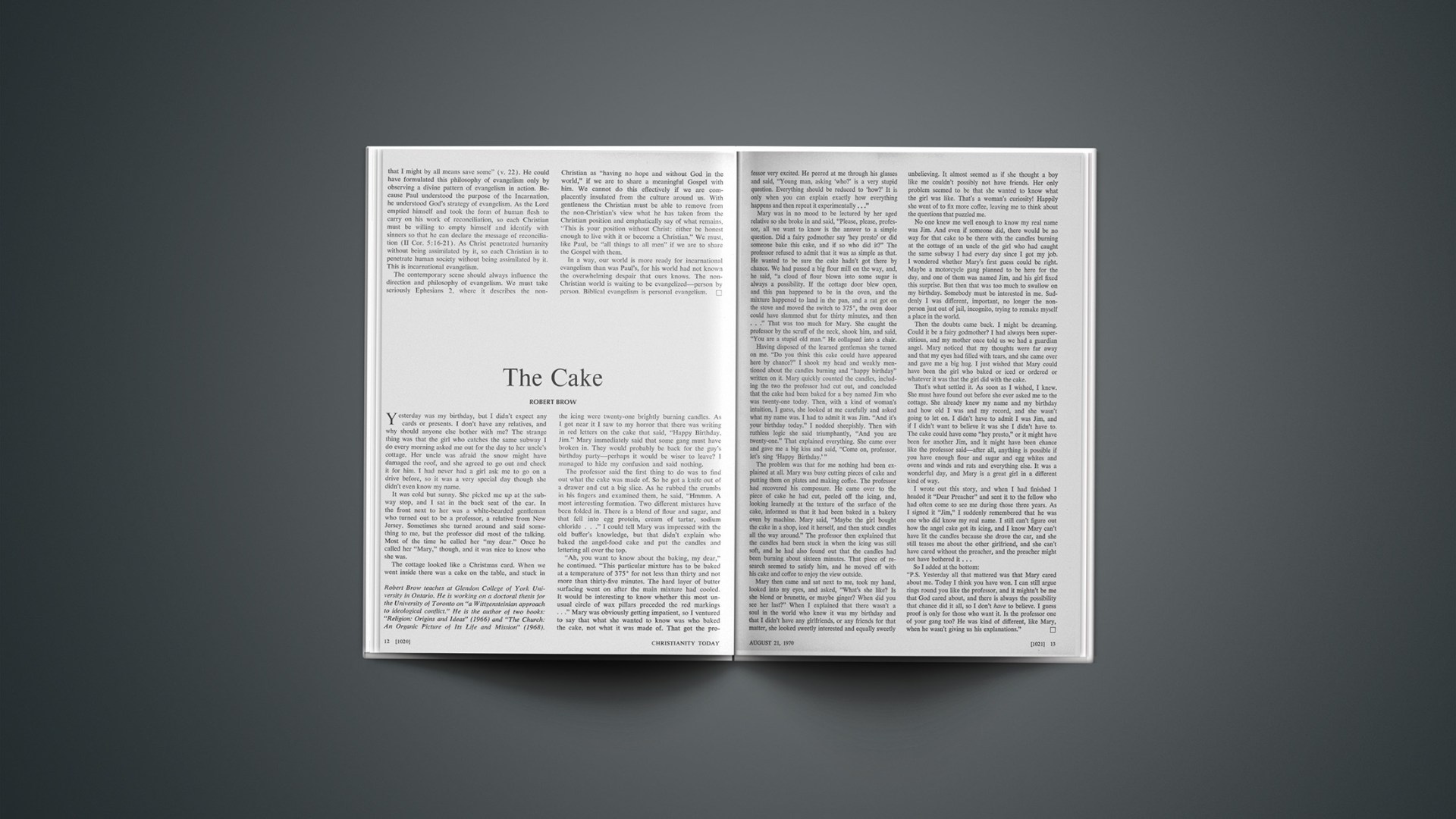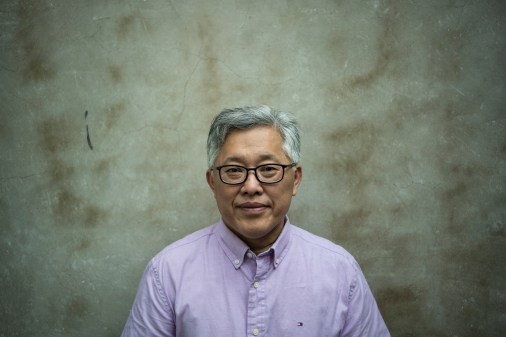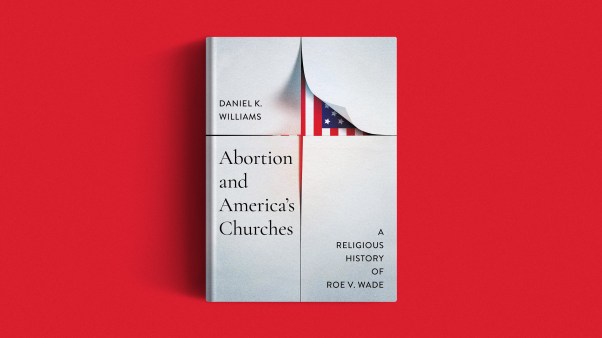Yesterday was my birthday, but I didn’t expect any cards or presents. I don’t have any relatives, and why should anyone else bother with me? The strange thing was that the girl who catches the same subway I do every morning asked me out for the day to her uncle’s cottage. Her uncle was afraid the snow might have damaged the roof, and she agreed to go out and check it for him. I had never had a girl ask me to go on a drive before, so it was a very special day though she didn’t even know my name.
It was cold but sunny. She picked me up at the subway stop, and I sat in the back seat of the car. In the front next to her was a white-bearded gentleman who turned out to be a professor, a relative from New Jersey. Sometimes she turned around and said something to me, but the professor did most of the talking. Most of the time he called her “my dear.” Once he called her “Mary,” though, and it was nice to know who she was.
The cottage looked like a Christmas card. When we went inside there was a cake on the table, and stuck in the icing were twenty-one brightly burning candles. As I got near it I saw to my horror that there was writing in red letters on the cake that said, “Happy Birthday, Jim.” Mary immediately said that some gang must have broken in. They would probably be back for the guy’s birthday party—perhaps it would be wiser to leave? I managed to hide my confusion and said nothing.
The professor said the first thing to do was to find out what the cake was made of. So he got a knife out of a drawer and cut a big slice. As he rubbed the crumbs in his fingers and examined them, he said, “Hmmm. A most interesting formation. Two different mixtures have been folded in. There is a blend of flour and sugar, and that fell into egg protein, cream of tartar, sodium chloride …” I could tell Mary was impressed with the old buffer’s knowledge, but that didn’t explain who baked the angel-food cake and put the candles and lettering all over the top.
“Ah, you want to know about the baking, my dear,” he continued. “This particular mixture has to be baked at a temperature of 375° for not less than thirty and not more than thirty-five minutes. The hard layer of butter surfacing went on after the main mixture had cooled. It would be interesting to know whether this most unusual circle of wax pillars preceded the red markings …” Mary was obviously getting impatient, so I ventured to say that what she wanted to know was who baked the cake, not what it was made of. That got the professor very excited. He peered at me through his glasses and said, “Young man, asking ‘who?’ is a very stupid question. Everything should be reduced to ‘how?’ It is only when you can explain exactly how everything happens and then repeat it experimentally …”
Mary was in no mood to be lectured by her aged relative so she broke in and said, “Please, please, professor, all we want to know is the answer to a simple question. Did a fairy godmother say ‘hey presto’ or did someone bake this cake, and if so who did it?” The professor refused to admit that it was as simple as that. He wanted to be sure the cake hadn’t got there by chance. We had passed a big flour mill on the way, and, he said, “a cloud of flour blown into some sugar is always a possibility. If the cottage door blew open, and this pan happened to be in the oven, and the mixture happened to land in the pan, and a rat got on the stove and moved the switch to 375°, the oven door could have slammed shut for thirty minutes, and then …” That was too much for Mary. She caught the professor by the scruff of the neck, shook him, and said, “You are a stupid old man.” He collapsed into a chair.
Having disposed of the learned gentleman she turned on me. “Do you think this cake could have appeared here by chance?” I shook my head and weakly mentioned about the candles burning and “happy birthday” written on it. Mary quickly counted the candles, including the two the professor had cut out, and concluded that the cake had been baked for a boy named Jim who was twenty-one today. Then, with a kind of woman’s intuition, I guess, she looked at me carefully and asked what my name was. I had to admit it was Jim. “And it’s your birthday today.” I nodded sheepishly. Then with ruthless logic she said triumphantly, “And you are twenty-one.” That explained everything. She came over and gave me a big kiss and said, “Come on, professor, let’s sing ‘Happy Birthday.’ ”
The problem was that for me nothing had been explained at all. Mary was busy cutting pieces of cake and putting them on plates and making coffee. The professor had recovered his composure. He came over to the piece of cake he had cut, peeled off the icing, and, looking learnedly at the texture of the surface of the cake, informed us that it had been baked in a bakery oven by machine. Mary said, “Maybe the girl bought the cake in a shop, iced it herself, and then stuck candles all the way around.” The professor then explained that the candles had been stuck in when the icing was still soft, and he had also found out that the candles had been burning about sixteen minutes. That piece of research seemed to satisfy him, and he moved off with his cake and coffee to enjoy the view outside.
Mary then came and sat next to me, took my hand, looked into my eyes, and asked, “What’s she like? Is she blond or brunette, or maybe ginger? When did you see her last?” When I explained that there wasn’t a soul in the world who knew it was my birthday and that I didn’t have any girlfriends, or any friends for that matter, she looked sweetly interested and equally sweetly unbelieving. It almost seemed as if she thought a boy like me couldn’t possibly not have friends. Her only problem seemed to be that she wanted to know what the girl was like. That’s a woman’s curiosity! Happily she went of to fix more coffee, leaving me to think about the questions that puzzled me.
No one knew me well enough to know my real name was Jim. And even if someone did, there would be no way for that cake to be there with the candles burning at the cottage of an uncle of the girl who had caught the same subway I had every day since I got my job. I wondered whether Mary’s first guess could be right. Maybe a motorcycle gang planned to be here for the day, and one of them was named Jim, and his girl fixed this surprise. But then that was too much to swallow on my birthday. Somebody must be interested in me. Suddenly I was different, important, no longer the nonperson just out of jail, incognito, trying to remake myself a place in the world.
Then the doubts came back. I might be dreaming. Could it be a fairy godmother? I had always been superstitious, and my mother once told us we had a guardian angel. Mary noticed that my thoughts were far away and that my eyes had filled with tears, and she came over and gave me a big hug. I just wished that Mary could have been the girl who baked or iced or ordered or whatever it was that the girl did with the cake.
That’s what settled it. As soon as I wished, I knew. She must have found out before she ever asked me to the cottage. She already knew my name and my birthday and how old I was and my record, and she wasn’t going to let on. I didn’t have to admit I was Jim, and if I didn’t want to believe it was she I didn’t have to. The cake could have come “hey presto,” or it might have been for another Jim, and it might have been chance like the professor said—after all, anything is possible if you have enough flour and sugar and egg whites and ovens and winds and rats and everything else. It was a wonderful day, and Mary is a great girl in a different kind of way.
I wrote out this story, and when I had finished I headed it “Dear Preacher” and sent it to the fellow who had often come to see me during those three years. As I signed it “Jim,” I suddenly remembered that he was one who did know my real name. I still can’t figure out how the angel cake got its icing, and I know Mary can’t have lit the candles because she drove the car, and she still teases me about the other girlfriend, and she can’t have cared without the preacher, and the preacher might not have bothered it …
So I added at the bottom:
“P.S. Yesterday all that mattered was that Mary cared about me. Today I think you have won. I can still argue rings round you like the professor, and it mightn’t be me that God cared about, and there is always the possibility that chance did it all, so I don’t have to believe. I guess proof is only for those who want it. Is the professor one of your gang too? He was kind of different, like Mary, when he wasn’t giving us his explanations.”










